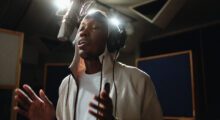6579 Results for “production”
-
Sundance 2024: Soundtrack to a Coup d’Etat, Nocturnes

Belgian filmmaker Johan Grimonprez’s first feature, 1997’s Dial H-I-S-T-O-R-Y, intertwined news footage of plane hijackings with voiceover readings of passages from Don DeLillo’s White Noise and Mao II—he’s no stranger to rendering sweeping diagnoses within unorthodox historical frameworks. Soundtrack to a Coup d’Etat re-examines the assassination of Patrice Lumumba; the Soundtrack portion of the title points to the film’s other main strand, the political roles of American jazz musicians during the period, ranging from unwittingly complicit—Louis Armstrong performed a show in the Congo unaware that he was providing cover for CIA actions—to actively dissident, with the film bookended by vocalist […]
by Vadim Rizov on Jan 23, 2024 -
“How You Bring a Story to Life Is Just a Question of Your Imagination”: Editor Otto Burnham on Super/Man: The Christopher Reeve Story


Archival footage and previously unseen home movies lend a new perspective of Christopher Reeve’s rise to stardom in Super/Man: The Christopher Reeve Story. Editor Otto Burnham shares his approach to cutting Ian Bonhôte and Peter Ettedgui’s doc, which makes it Sundance 2024 debut in the festival’s Premieres section. See all responses to our annual Sundance editor questionnaire here. Filmmaker: How and why did you wind up being the editor of your film? What were the factors and attributes that led to your being hired for this job? Burnham: I was rollerblading badly in East London on a bright, chilly January […]
by Filmmaker Staff on Jan 23, 2024 -
“Tell the Story That’s on the Page Thoughtfully and Compassionately”: DP Nathan M. Miller on Penelope


Mel Eslyn, the head of Duplass Brothers Productions and the director of TIFF 2022 premiere Biosphere, makes her first directorial foray into episodic television with Penelope. Penelope tells the story of an alienated 16-year-old girl who venture into the wilderness to escape from society. Nathan M. Miller, who served as cinematographer on Eslyn’s Biosphere and has worked on several other Duplass Brothers productions, took on the job again for Penelope. Below, he emphasizes the series’ naturalist aesthetic and no-frills approach to lighting. See all responses to our annual Sundance cinematographer interviews here. Filmmaker: How and why did you wind up being the […]
by Filmmaker Staff on Jan 23, 2024 -
“Debra is Incredibly Skilled at Recognizing What Will Remain Salient”: DPs Sean Hanley, Kefentse Johnson and Eric Phillips-Horst on Conbody VS Everybody


Conbody VS Everybody sees Debra Granik (Stray Dog) returning to documentary after 2018’s Leave No Trace and also breaking into the world of episodic series. The film follows Coss Marte as he creates a gym inspired by his own prison work outs in hopes of breaking the cycle of recidivism. Two episodes of Conbody VS Everybody will premiere at Sundance 2024. Below, series cinematographers Sean Hanley, Kefentse Johnson and Eric Phillips-Horst share how they all got involved in the film, how their personal styles blended with Granik’s and the challenges of shooting a series over many years. See all responses to […]
by Filmmaker Staff on Jan 23, 2024 -
“I ‘Write’ My Films in the Editing Room”: Editor Jules Rosskam on Desire Lines


Premiering in the NEXT section of the 2024 Sundance Film Festival, Desire Lines presents the time-traveling journey of an Iranian-American trans man, utilizing a vast archive of queer images in order to transport him between time and space. Filmmaker and queer scholar Jules Rosskam also served as the film’s co-writer, producer and editor. Below, he describes why he always opts to edit his own work, the various artists that inspire him and a reoccurring motif the film contains that revealed itself during the edit. See all responses to our annual Sundance editor questionnaire here. Filmmaker: How and why did you […]
by Filmmaker Staff on Jan 22, 2024 -
“The Spectacle of Elections” | Ramona S. Díaz, And So It Begins


Films are made of and from places: the locations they are filmed in, the settings they are meant to evoke, the geographies where they are imagined and worked on. What place tells its own story about your film, whether a particularly challenging location that required production ingenuity or a map reference that inspired you personally, politically or creatively? The Philippines—in all its contradictions, its beauty, its spectacle, its heartache. I’ve made many films about where I was born, but I’ve always wanted to make a film about exuberance, even if it does not have a happy ending in conventional terms. […]
by Filmmaker Staff on Jan 22, 2024 -
“The Ending Was Always Clear for Us”: Editor Emma Backman on As We Speak




Born and raised in the Bronx, rapper Kemba guides viewers through some of the largest issues involving rap lyrics, freedom of speech and the First Amendment in As We Speak, the directorial debut of J.M. Harper. Looking at cases both in the U.S. and internationally, Harper’s documentary poses insightful questions about who is protected, or perhaps left vulnerable, by these legislative battles. Emma Backman, who previously collaborated with Harper on a series of commercials, discusses her experience cutting the film, which served as one of her first major feature-length projects as an editor. See all responses to our annual Sundance […]
by Filmmaker Staff on Jan 22, 2024 -
“A Balance Between Look and Ergonomics”: Cinematographers Logan Triplett and Allison Anderson Triplett on As We Speak




Issues concerning freedom of speech and the First Amendment intersect with the world of rap music in As We Speak, the directorial debut from J.M. Harper. The documentary follows Bronx-based rapper Kemba as he unpacks how legal battles involving rap lyrics, both in the U.S. and abroad, might shape the the future of his craft. Married cinematographer duo Logan Triplett and Allison Anderson Triplett discuss the challenges and rewards of collaborating on this project as a unit—the first time they’ve done so on a feature film—with Logan penning answers for both parties. See all responses to our annual Sundance cinematographer […]
by Filmmaker Staff on Jan 22, 2024 -
“The Lush Forest, Throbbing With a Vast Diversity of Life, Emerges as a Character” | Anirban Dutta and Anupama Srinivasan, Nocturnes



Films are made of and from places: the locations they are filmed in, the settings they are meant to evoke, the geographies where they are imagined and worked on. What place tells its own story about your film, whether a particularly challenging location that required production ingenuity or a map reference that inspired you personally, politically or creatively? The opportunity to be in this incredibly rich and stunning forest in the Eastern Himalayas and make a film here has been life-altering for us. How to share what we saw with our eyes, heard with our ears, and felt with our being? Could […]
by Filmmaker Staff on Jan 22, 2024 -
“The Nexus of Art, Money and Violence Makes for a Seemingly Inescapable Loop” | J.M. Harper, As We Speak




Films are made of and from places: the locations they are filmed in, the settings they are meant to evoke, the geographies where they are imagined and worked on. What place tells its own story about your film, whether a particularly challenging location that required production ingenuity or a map reference that inspired you personally, politically or creatively? As We Speak investigates the war between rap lyrics and the criminal justice system by reaching back to the 400-year history of black lyrics in America. In order to communicate, enslaved Africans sang on slave ships in languages that their European captors […]
by Filmmaker Staff on Jan 22, 2024
